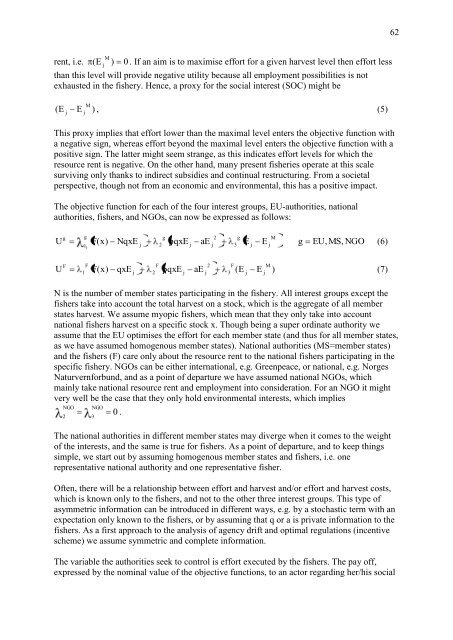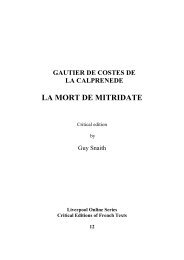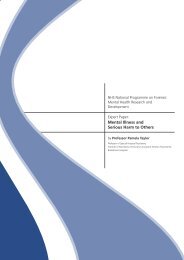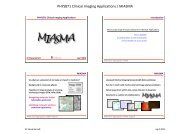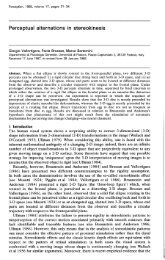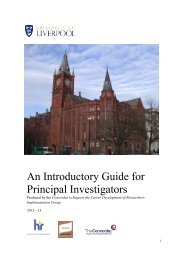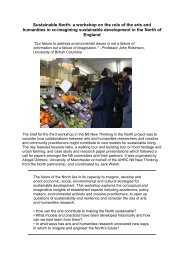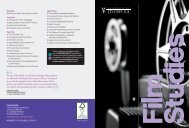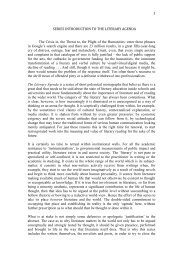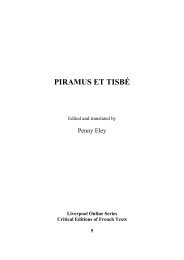Operational tools and adaptive management
Operational tools and adaptive management
Operational tools and adaptive management
You also want an ePaper? Increase the reach of your titles
YUMPU automatically turns print PDFs into web optimized ePapers that Google loves.
ent, i.e. E ) 0 . If an aim is to maximise effort for a given harvest level then effort less<br />
( M<br />
j<br />
than this level will provide negative utility because all employment possibilities is not<br />
exhausted in the fishery. Hence, a proxy for the social interest (SOC) might be<br />
M<br />
( E j E j ) , (5)<br />
This proxy implies that effort lower than the maximal level enters the objective function with<br />
a negative sign, whereas effort beyond the maximal level enters the objective function with a<br />
positive sign. The latter might seem strange, as this indicates effort levels for which the<br />
resource rent is negative. On the other h<strong>and</strong>, many present fisheries operate at this scale<br />
surviving only thanks to indirect subsidies <strong>and</strong> continual restructuring. From a societal<br />
perspective, though not from an economic <strong>and</strong> environmental, this has a positive impact.<br />
The objective function for each of the four interest groups, EU-authorities, national<br />
authorities, fishers, <strong>and</strong> NGOs, can now be expressed as follows:<br />
U<br />
U<br />
g<br />
F<br />
g<br />
1<br />
F<br />
1<br />
F(<br />
x)<br />
F(<br />
x)<br />
NqxE<br />
qxE<br />
j<br />
j<br />
F<br />
2<br />
g<br />
2<br />
pqxE<br />
pqxE<br />
j<br />
j<br />
aE<br />
aE<br />
2<br />
j<br />
2<br />
j<br />
F<br />
3<br />
g<br />
3<br />
( E<br />
E<br />
j<br />
j<br />
E<br />
E<br />
M<br />
j<br />
M<br />
j<br />
)<br />
g<br />
EU,<br />
MS,<br />
NGO<br />
N is the number of member states participating in the fishery. All interest groups except the<br />
fishers take into account the total harvest on a stock, which is the aggregate of all member<br />
states harvest. We assume myopic fishers, which mean that they only take into account<br />
national fishers harvest on a specific stock x. Though being a super ordinate authority we<br />
assume that the EU optimises the effort for each member state (<strong>and</strong> thus for all member states,<br />
as we have assumed homogenous member states). National authorities (MS=member states)<br />
<strong>and</strong> the fishers (F) care only about the resource rent to the national fishers participating in the<br />
specific fishery. NGOs can be either international, e.g. Greenpeace, or national, e.g. Norges<br />
Naturvernforbund, <strong>and</strong> as a point of departure we have assumed national NGOs, which<br />
mainly take national resource rent <strong>and</strong> employment into consideration. For an NGO it might<br />
very well be the case that they only hold environmental interests, which implies<br />
NGO<br />
2<br />
NGO<br />
3<br />
0 .<br />
The national authorities in different member states may diverge when it comes to the weight<br />
of the interests, <strong>and</strong> the same is true for fishers. As a point of departure, <strong>and</strong> to keep things<br />
simple, we start out by assuming homogenous member states <strong>and</strong> fishers, i.e. one<br />
representative national authority <strong>and</strong> one representative fisher.<br />
Often, there will be a relationship between effort <strong>and</strong> harvest <strong>and</strong>/or effort <strong>and</strong> harvest costs,<br />
which is known only to the fishers, <strong>and</strong> not to the other three interest groups. This type of<br />
asymmetric information can be introduced in different ways, e.g. by a stochastic term with an<br />
expectation only known to the fishers, or by assuming that q or a is private information to the<br />
fishers. As a first approach to the analysis of agency drift <strong>and</strong> optimal regulations (incentive<br />
scheme) we assume symmetric <strong>and</strong> complete information.<br />
The variable the authorities seek to control is effort executed by the fishers. The pay off,<br />
expressed by the nominal value of the objective functions, to an actor regarding her/his social<br />
(6)<br />
(7)<br />
62


